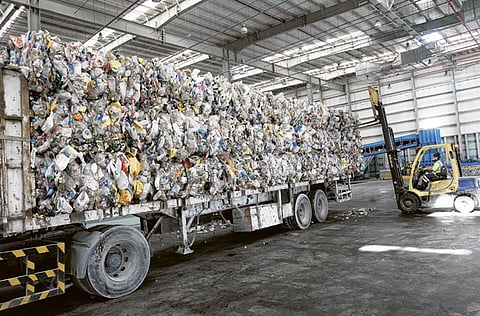Encouraging 'green thinking'
Those who practise recycling must share what they know and convey positive results of their efforts

Effective waste management is a precondition for ensuring sustainable economic growth and social development. It is also important to prevent harm to human health and the environment.
The UAE has seen massive development and has been a global leader in renewable energy but its waste management is currently below the average compared to other developed economies. Take for instance the estimated 500 million canned beverages consumed annually in the country — only 5 per cent of these cans are sent for recycling as compared to a world-wide average of 63 per cent.
An integrated and practical approach to waste management is required to fill the gap and this can be done first and foremost by generating awareness among our residents and then by organising and mobilising them in various green activities such as recycling.
Inculcating environmental consciousness, particularly among adults, can be a taxing process but we must be unrelenting in educating them. Soon they will realise that taking just a moment to put their refuse in a recycling bin will add up to save everyone years of environmental harm caused by overcrowded landfills, production of new materials and depletion of our natural resources.
Recycling helps conserve important raw materials and also saves energy. For example, recycling one aluminium can saves enough energy to run a TV for three hours or the equivalent of half a gallon of gasoline will be conserved.
Using recycled materials in manufacturing uses less energy than that required for producing new products from raw materials even if we factor in other associated costs including transportation, storage, etc. Actually, more energy is required to extract, refine, transport and process raw materials as compared with recycling industry-related materials.
Recyclable materials reprocessed into new products also results in the reduction of rubbish sent to landfill sites and consequently we reduce the emission of methane, a powerful greenhouse gas which exacerbates climate change.
In theory, we have an inexhaustible supply of aluminium materials circulating right now that we don't need to produce it any more from its raw material bauxite ore if only we succeed in recycling aggressively.
Recycling can also be utilised to support philanthropy. A story published recently in Friday magazine featured how a Filipino expat in Abu Dhabi has paid for the education of two children and has given books and supplies to 150 other kids back in his home town in the Philippines by simply collecting aluminium cans. He said he got the inspiration from the Emirates Environmental Group (EEG) of collecting recyclables and came up with the idea of selling aluminium cans to fund his initiative.
No rocket science
Recycling is a environment-friendly activity which can also be turned into family and social bonding activity. Every Saturday, families come to our office in Jumeirah to drop off their recyclable materials. Kids are taught and encouraged by their parents to recycle and the kids become young eco-guardians.
The sight people doing their share in nurturing our environment is very inspiring, but still there are many others who simply shrug off when we talk about recycling. There is, however, no rocket science involved in recycling. All we need is a change of attitude and those people who already practise recycling must share what they know and convey the positive effects of their recycling efforts and tell others how else they can contribute.
If we notice abundant trash in our neighbourhood, we can initiate a community recycling programme or better yet participate in recycling campaigns that the EEG has started.
The fact is many of our resources as well as our planet is not renewable and we have to take it upon ourselves to preserve our environment. We must demonstrate a strong commitment in protecting our environment and position the UAE as a leader in green thinking.
The EEG is now on its 15th Cycle of the Aluminium Can Collection Campaign. The campaign was initiated in 1997 and has attracted loyal participation and support from the government, various private companies, hotels, schools, universities, families and individuals. There will be a Can Collection Day on February 23 in various locations across the country.
Habiba Al Marashi is the Chairperson of Emirates Environmental Group (EEG) and Board Member of the United Nations Global Compact.For more details, contact the EEG at 04 3448622/ email: eeg@emirates.net.ae or visit www.eeg-uae.org
Sign up for the Daily Briefing
Get the latest news and updates straight to your inbox


